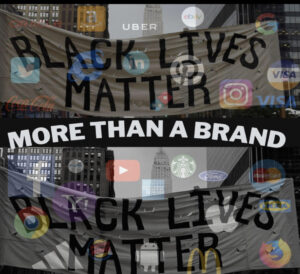
marketing strategy. Photo courtesy Tazjhani Baker
With the constant focus on race in America, Black Americans have been highlighted more than ever throughout the media.
African-Americans can be seen in positions such as, the newly crowned Miss USA and several other campaigns led by major corporations such as Nike, setting a precedent with a Colin Kaepernick advertisement.
As protests continue around the country against systemic racism and police brutality, Black Americans are wondering if these opportunities are only starting to appear as a way to strategically brand these corporations as a place of diversity.
Even when there is representation in the media, it is easy for it to be seen as cliche, shallow or cynical.
According to the United States Census Bureau, African Americans are the second largest racial minority, comprising an estimated 13.4% of the population.
At the dawn of the movement, very few corporations cared to touch the topics of injustice. It wasn’t until after several brands discovered the power of Black Twitter and the impact of the “woke” Black consumers that we began to see a shift.
Now, companies have started paying attention. The Black consumer brand loyalty is ultimately what decides if a brand will be perceived as real, trendy, woke or accountable.
According to a report from Nielsen Global Connect, research shows that Black consumer choices have a “cool factor” that has created a halo effect, influencing not just consumers of color but the mainstream as well.
With the help of social media, Black consumers managed to secure their spot at the table and are requiring these marketing strategists and companies to address them in ways that resonate socially — if these companies want their coins.
NASCAR’s managing director of national sales, Michale C. Long, says that most companies are missing authenticity when it comes to marketing toward the Black community.
“Most companies hire these advertising agencies to do these case studies on Black culture and the Black experience,” Long told The Famuan.“Authenticity is missing, the whole idea of Black-Americans being able to fit into one box is false. As a community, we are far more diverse and complex.”
Due to the large buying power that Black Americans have, it is easy to question the industry’s motives and if the large influx of Black people in the media is both genuine and pure.
Currently, African Americans spend $1.2 trillion annually, so these brands recognize that they have a lot to lose.
NAACP member and activist Tammi Garrett says that buying Black is one way that the African-American community can stop contributing to the same nation that is ultimately tearing us down.
“There are family businesses that have been around for decades, but rarely receive their flowers,” Garrett said “these businesses have stood back for years as their own community would rather support huge corporations that use their Blackness to gain importance over a business that knows their Blackness is important.”
The Nike advertisement has contributed heavily to major corporations using this climate of Black in America as a campaign strategy, after the Nike ad was released featuring Colin Kaepernick, many felt that Nike had sided with Black America and for that, there was a big influx of sales as well as tweets supporting both Nike and Kapernick.
It didn’t take long for other companies to recognize the feedback Nike received and begin weighing the outcomes of the good publicity versus the few small portions of the consumers that were against the advertisement. Nike had unknowingly set the standard for major corporations supporting the movement.
While Nike took the risk of losing business, other companies were not so eager to show their support. Many people have decided to boycott certain department stores until they see a different plan of action. Marianna-based Black business owner Gwen Sims-Long doesn’t necessarily feel that boycotting is the answer.
“I whole-heartedly support Black-owned businesses,” Sims-Long said. “However, I feel like for so many people it will be hard to solely support black-owned businesses alone, especially in rural towns where major corporations have somewhat monopolized the area.”
It has been questionable if the plight of the American consumer is at the expense of being Black in America. While we cannot really be sure if these are genuine efforts on behalf of these major corporations, we can learn and become more aware of the power that both buying and being Black have on our economy.